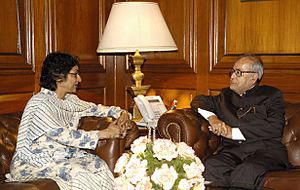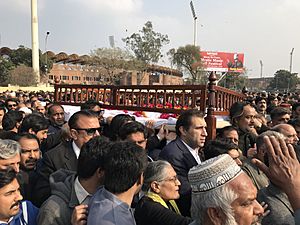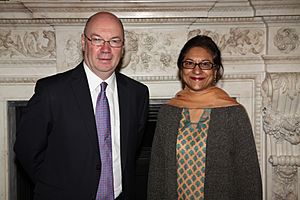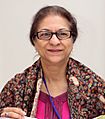Asma Jahangir facts for kids
Quick facts for kids
Asma Jahangir
NI HI
|
|
|---|---|
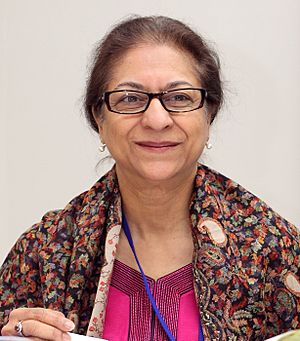
Jahangir in 2013
|
|
| United Nations Special Rapporteur for Human Rights in Iran | |
| In office 1 November 2016 – 11 February 2018 |
|
| Preceded by | Ahmed Shaheed |
| Succeeded by | Javaid Rehman |
| President of Supreme Court Bar Association of Pakistan | |
| In office 27 October 2010 – 31 October 2011 |
|
| Preceded by | Qazi Anwar |
| Succeeded by | Rasheed A Rizvi |
| Head of Human Rights Commission of Pakistan | |
| In office 1987–2011 |
|
| Preceded by | Position established |
| Succeeded by | Zohra Yusuf |
| Personal details | |
| Born |
Asma Jilani
27 January 1952 Lahore, Punjab, Pakistan |
| Died | 11 February 2018 (aged 66) Lahore, Punjab, Pakistan |
| Cause of death | Brain hemorrhage |
| Spouse | Tahir Jahangir |
| Children | 3, including Munizae |
| Relatives | Hina Jilani (sister) |
| Residence | Lahore |
| Alma mater | Punjab University (LL.B.) Kinnaird College (BA) |
| Profession | Lawyer, Human Rights Activist |
| Awards | Hilal-i-Imtiaz (2010) Martin Ennals Award (1995) Ramon Magsaysay Award (2005) Leo Eitinger Award (2002) Four Freedoms Award (2010) Right Livelihood Award, United Nations Prize in the Field of Human Rights (2018) Nishan-e-Imtiaz (2018) (Posthumously) |
Asma Jilani Jahangir (Urdu: عاصمہ جہانگیر, romanized: ʿĀṣimah Jahāṉgīr; 27 January 1952 – 11 February 2018) was a brave Pakistani human rights lawyer and social activist. She was known for standing up for what was right. Asma co-founded and led the Human Rights Commission of Pakistan, an important group that works to protect people's rights.
She played a big part in the Lawyers' Movement, which fought for fair laws in Pakistan. She also served as a special expert for the United Nations, helping to protect freedom of religion around the world.
Contents
Early Life and Education
Asma Jahangir was born in Lahore, Pakistan, on January 27, 1952. She came from a family that cared deeply about human rights and politics. Her father, Malik Ghulam Jilani, was a government worker who later became a politician. He was often jailed for speaking out against military rulers. He even spoke against the government's actions in what is now Bangladesh.
Her mother, Begum Sabiha Jilani, was also a strong woman. She went to college when it was rare for Muslim women to get higher education. She even started her own clothing business.
Asma herself started protesting against unfair rules when she was young. She studied at Kinnaird College and then got her law degree from Punjab University in 1978. She also received special honorary degrees from several universities around the world.
Asma married Tahir Jahangir. They had three children: a son and two daughters, Munizae and Sulema. Munizae became a journalist, and Sulema also became a lawyer.
Fighting for Human Rights
Asma Jahangir spent her life defending the rights of people in Pakistan. She especially focused on women's rights, the rights of religious minorities, and the rights of children. She strongly disagreed with certain laws in Pakistan, like the Hudood Ordinance and blasphemy laws, which she felt were unfair.
In 1980, Asma and her sister, Hina Jilani, started the first law firm in Pakistan run by women. They also helped create the Women’s Action Forum (WAF). This group worked to change unfair laws, like one that said a woman's testimony in court was worth half that of a man's. In 1983, Asma and other WAF members were arrested during a protest against this law.
In 1986, Asma and Hina opened AGHS Legal Aid, which was Pakistan's first free legal help center. This center also ran a shelter called 'Dastak' for women who needed a safe place. Asma also spoke out against forced conversions and child labor. She believed that everyone should have equal rights.
She also worked to stop human rights abuses in government and police custody. She pointed out that women were often mistreated while in custody.
In 1996, a court ruled that adult Muslim women needed their male guardian's permission to marry. Asma fought against this, saying it would lead to more harassment of women. She took on cases to help women who were affected by this ruling.
Important Roles and Achievements
Asma Jahangir was a founding member of the Human Rights Commission of Pakistan. She served as its Secretary-General and later became its chairperson. This organization played a crucial role in monitoring and reporting on human rights issues in Pakistan.
She was also the first woman in Pakistan to become the President of the Supreme Court Bar Association of Pakistan. This was a big achievement, showing her leadership and respect within the legal community.
Asma worked with the United Nations as a Special Rapporteur on Freedom of Religion from 2004 to 2010. In this role, she investigated human rights issues in different countries. Later, in 2016, she became the UN Special Rapporteur on the Situation of Human Rights in Iran.
In 2007, when a state of emergency was declared in Pakistan, Asma was put under house arrest. She continued to speak out for justice and democracy even while confined.
Asma Jahangir was known for her strong and direct way of speaking. She was not afraid to challenge powerful people or unfair rules. She believed in a fair and open society for everyone.
Public Image and Challenges
Asma Jahangir was a very well-known figure, both loved and criticized. Some people made false accusations against her, calling her a "traitor" for her work. However, many saw her as a hero who fought for justice.
She faced many threats because of her activism. In 1995, after she successfully defended a young Christian boy accused of blasphemy, a mob attacked her car and threatened her. Despite these dangers, she never stopped fighting for what she believed in.
In 2005, she organized a marathon to raise awareness about violence against women. During this event, she and other participants faced harsh treatment from the police. She said they tried to humiliate her, but she continued to stand strong.
Asma Jahangir's work inspired many. The character of a lawyer in the 2004 Indian film Veer-Zaara was based on her. This shows how her dedication to justice was recognized even internationally.
Author
Besides her legal and activist work, Asma Jahangir also wrote books. Her books include Divine Sanction? The Hudood Ordinance (1988, 2003) and Children of a Lesser God: Child Prisoners of Pakistan (1992). These books explored important social and legal issues in Pakistan.
Death and Legacy
Asma Jahangir passed away on February 11, 2018, in Lahore, after suffering a brain hemorrhage. Her death was a great loss for human rights advocates around the world.
Her legacy lives on through the many people she inspired and the organizations she helped build. She is remembered as a fearless champion of human rights, who dedicated her life to making Pakistan and the world a fairer place.
Awards
Asma Jahangir received many important awards for her work:
- In 1995, she received the Martin Ennals Award for Human Rights Defenders and the Ramon Magsaysay Award.
- In 2000, she received the King Baudouin International Development Prize.
- In 2001, she and her sister Hina Jilani were given the Millennium Peace Prize.
- In 2002, she was awarded the Lisl and Leo Eitinger Prize.
- In 2005, she was nominated for the Nobel Peace Prize.
- In 2010, she received the Freedom of Worship Medal and the Hilal-i-Imtiaz, one of Pakistan's highest civilian awards.
- In 2010, she also won the UNESCO/Bilbao Prize for the Promotion of a Culture of Human Rights.
- In 2012, she received the North-South Prize of the Council of Europe.
- In 2014, she was awarded The Right Livelihood Award for her brave work in defending human rights.
- In 2018, after her death, she was given the United Nations Prize in the Field of Human Rights and Pakistan's highest civilian award, the Nishan-e-Imtiaz.
Images for kids
See also
 In Spanish: Asma Jahangir para niños
In Spanish: Asma Jahangir para niños
 | Sharif Bey |
 | Hale Woodruff |
 | Richmond Barthé |
 | Purvis Young |


